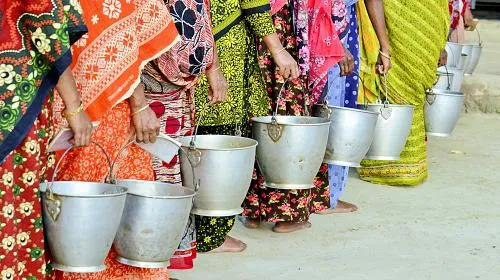Through their “Making Markets More Inclusive: Lessons from CARE and the Future of Sustainability in Agricultural Value Chain Development,” co-authors Kevin McKague and Muhammad Siddiquee probe how poor people, especially women, add value at every step in the process of bringing dairy products to market.
ATLANTA (Feb. 5, 2015) – Throughout northwest Bangladesh, where incomes average $1 per day, CARE helps strengthen markets that govern how small dairy farmers earn a living, a new book on the inner workings of “value chains” concludes. Small Bangladeshi dairy farmers typically own one to three cows, yet produce 90 percent of the country’s milk supply, co-authors Kevin McKague of Cape Breton University in Canada and Muhammad Siddiquee of CARE Bangladesh reveal in the book published by Palgrave Macmillan. Based on five years of field experience, study and research in northwest Bangladesh, the book examines that region’s dairy value chain, positioning farmers as vital links in the chain of activities that must occur for raw products to reach markets.
“Making Markets More Inclusive: Lessons from CARE and the Future of Sustainability in Agricultural Value Chain Development” offers in-depth insight into how non-profit and profit organizations can connect poor producers in developing economies with the right markets to deliver deeper social and economic impact – as CARE has done with some 50,000 dairy farmers in northwest Bangladesh.
“Most studies of doing business at the ‘bottom of the economic pyramid’ focus on viewing the poor as consumers, as micro-entrepreneurs, or as potential employees of local companies,” says McKague, associate professor of Social Entrepreneurship and Strategy at the Shannon School of Business, Cape Breton University in Canada, and Research Fellow with the Center for Peace, Democracy and Development at the University of Massachusetts in Boston. “Almost no analysis focuses on the poor as primary producers of agricultural commodities, just like the farmers in northwest Bangladesh. That’s a striking omission given that producers like them are by far the largest segment of the working-age population in developing economies.”
Drawing from both anecdotal and quantifiable evidence, “Making Markets More Inclusive” explores CARE’s efforts to support participant farmers – most of them women – by strengthening the entire chain those farmers access in order to get their milk to market. From animal healthcare interventions such as necessary vaccinations that improve health and milk productivity to milk collection points that yield a fair milk price, a stronger value chain means more income for farmers. The program’s successes are clear:
- Participant farmers have increased their cows’ milk production by 48 percent.
- Milk consumption in farmers’ household has increased 46 percent.
- Daily income from milk sales has increased 97 percent.
But, as Siddiquee, program coordinator, Agriculture and Value Chains at CARE Bangladesh, points out, the benefits don’t end with the farmers.
“Shops selling feed and medicines, for example, and animal health workers providing important vaccinations now serve entire communities, not just the farmers in CARE’s program,” he said. “Technologies like cattle health cards and digital fat testing machines have taken root in Bangladesh as well.”
The success of CARE’s Strengthening the Dairy Value Chain has influenced agricultural value chains in Malawi, Tanzania, Ghana, India and Mali.
Watch a video about the book: CARE Knows How: Making Markets More Inclusive. Visit CARE’s YouTube channel to watch videos about the impact the value chain program is having on lives and communities in northwest Bangladesh: https://www.youtube.com/user/careusa. Buying the Book: “Making Markets More Inclusive: Lessons from CARE and the Future of Sustainability in Agricultural Value Chain Development” is available at www.amazon.com and from other book sellers. All proceeds from the sale of the book support CARE programming.
Media interviews
Co-authors McKague and Siddiquee are available for interviews by contacting Brian Feagans at bfeagans@care.org or Nicole Harris at nharris@care.org.

